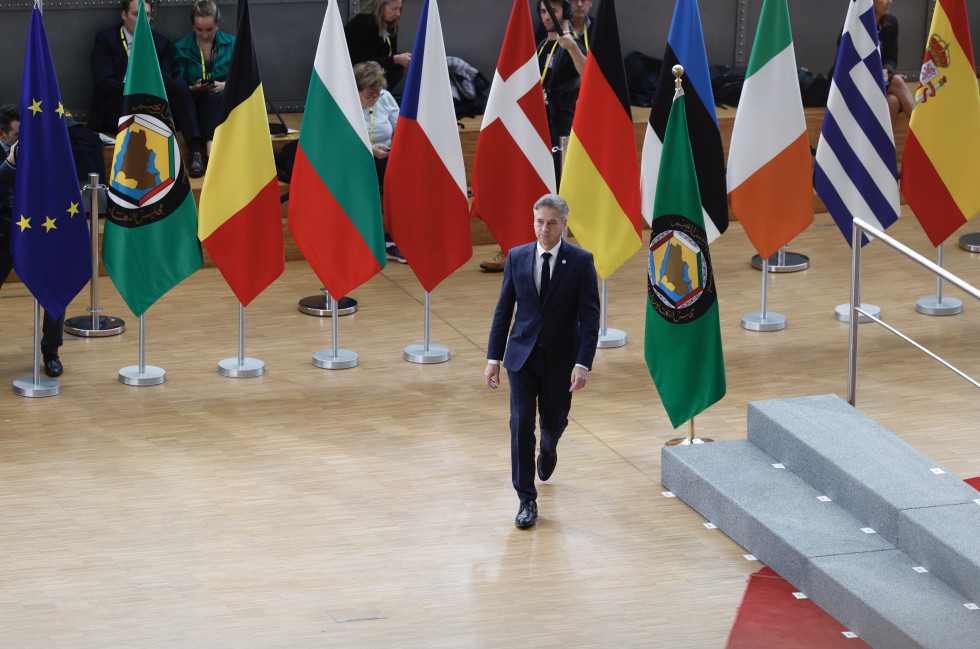Prime Minister: “We support measures that would lead to the cessation of hostilities and military attacks.”

Prime Minister Robert Golob is today attending the first summit between the European Union and the Gulf Cooperation Council | Author European Union
It offers an opportunity to develop a closer partnership with the GCC and its member states (the United Arab Emirates, the Kingdom of Bahrain, the Kingdom of Saudi Arabia, the Sultanate of Oman, the State of Qatar and the State of Kuwait), which are geostrategic partners in a difficult geopolitical situation.
The Summit’s agenda includes a discussion about common challenges, economic cooperation, energy, sustainability and connectivity. "I believe that most of the talks will be about the catastrophic situation in the Middle East, how to achieve a ceasefire and how to deliver humanitarian aid, and, of course, how to stop the war’s escalation," said Prime Minister Robert Golob in his statement to the press upon his arrival at the GCC Summit.
He added that the leaders of the nine Mediterranean EU Member states had discussed and agreed on these issues a week before at a meeting in Cyprus. "This was great progress, and I hope that we can achieve a similar degree of unity today, at least as far as humanitarian aid and ceasefires are concerned, also at the level of the entire European Union. Slovenia stood up to support the position of Jordan, which is one of the few countries acting as guarantors of stability and peace in the Middle East," said the Prime Minister.
“For the first time, we have the opportunity to discuss this issue at the regional level directly with the Gulf states. I look forward to this discussion," said the Prime Minister, adding that Jordan's role was similar to that of Slovenia’s in the UN Security Council. "It is a multifaceted matter. Jordan is also very active in the delivery of humanitarian aid and plays an important role in this area in the entire region. One of the points of discussion will be the plan for delivering humanitarian aid,” added the Prime Minister. The leaders attending the Summit will also touch on the commitment of the international community, both the United Nations and the European Union, to preventing the escalation of the situation in Lebanon.
“As we can see, Israel is not giving up here. "I think that tomorrow at the European Council, even more than today, we can develop a discussion on how and with what measures Israel can be forced to stop military operations in Lebanon, and particularly attacks on the United Nations mission,” said the Prime Minister. “Slovenia and other EU Member States call on Israel to immediately stop the attacks,” he added.
As for Jordan, the Prime Minister said that, in addition to the humanitarian plan for Gaza, the question is also how to help Jordan financially and by taking other measures to protect its territory. "Slovenia supports all measures taken to end to the war and Israel's military attacks on both Lebanon and Gaza. Slovenia is among active supporters of the embargo on arms exports and addressing the human rights issue in the framework of the association agreement."
The Prime Minister reiterated that the only political solution was a two-state solution. "There has been a lot of talk about this, but, unfortunately, without any progress so far. Both Netanyahu and his government, as well as Hamas, reject this solution and will obviously have to be forced into accepting it by other means. It is the international community that will bear a huge responsibility for this. Every initiative is useful, but I am afraid that we are still quite far from a solution," said the Prime Minister. He went on to say that today's Summit offered the first opportunity for progress in this area. "The only solution for Europe and the Gulf states would be to form some kind of alliance under the auspices of the United Nations, which would then provide security guarantees to Israel on the one hand, and ensure control over Gaza on the other," said the Prime Minister and added that, in his opinion, this was not yet feasible.
It should be recalled that, at the press conference following the meeting of MED-9 leaders, which was held last week, Prime Minister Golob announced that Slovenia would propose an EU conclusion recognising Jordan’s importance for stability in the region and recognising that the Union should do everything it can to protect Jordan’s safety and borders. At the European Council meeting in October 2023, Prime Minister Golob presented Slovenia’s proposal for the EU to recognise the important role played by Jordan and Egypt in efforts to ensure stability and peace in the Middle East. The conclusion was adopted by the European Council in June 2024.

